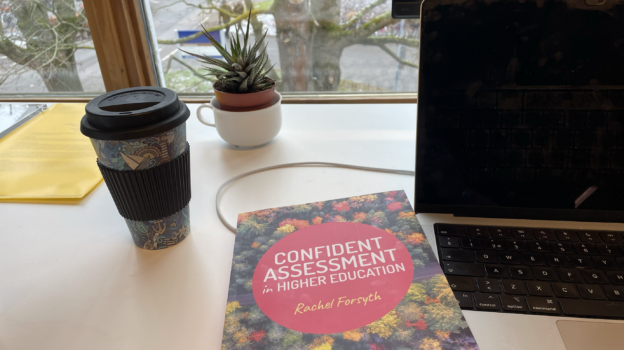I am so lucky to work with so many inspiring colleagues here at Lund University, and today I read my awesome colleague Rachel Forsyth’s new book on “confident assessment in higher education” (Forsyth, 2023). It is a really comprehensive introduction to assessment and totally worth a read, as an introduction to assessment or even just for a refresher of all the different aspects that need to be considered, and suggestions for how to think about them (while reading, I sent several photos of tables to a colleague because it is directly relevant for a course she is planning that we talked about the other day). For me, the most interesting part were the suggested questions to ask yourself about assignment tasks, and ways to answer them:
The first question, about validity (“Does it let students demonstrate achievement of learning outcomes?”), is maybe not surprising, as is the third one about clarity (“Will students understand what to do and how this task fits into their course overall?”). Of course, those are always good to ask! But the second question, about manageability (“Will it be straightforward to mark, give feedback, and moderate?”) and satisfaction (“Will I look forward to marking it?”) offer a really useful perspective on assessment. Of course there are many criteria that assessment should fulfill — but let’s not forget about the teachers who have to actually deal with it! Making this an explicit and important consideration is so important. And this is where this book is super useful for teachers. There are lots of concrete suggestions on aspects like for example how to penalize for overlong assignments (which you might want to do not just for fairness and to train students to keep to specified boundary conditions, but also to manage your own time), or how to build in options like short oral examinations to deal with suspected academic dishonesty already in the planning of the assessment.
Regarding whether I will look forward to marking an assessment, there are some suggestions in the book that would work that way for me, personally. For example if a final assignment is prepared and structured through regular tasks that contribute to the final product (“Pick one of the titles, or write your own, and write down five reasons why you want to write about it”, “Find one relevant paper and write a synopsis which links it to your chosen title”, “Write an outline”, “Write a summary of your arguments in 250 words”, …), these submissions will let me know that students are on the right track and give me the opportunity for feedback, and improve the quality of the final product, both of which make the process more fun.
I also really appreciate the humor in the book, for example a reference to (presumably, I didn’t check) an article on teachers procrastinating on their grading, with the note to “only look this one up if you are already procrastinating” (which I wasn’t. Now I’m wondering though if I’m missing out on some secret joke there?).
If you currently have to assess, or will have to at some point, or need to talk to people who do, or are a student who wants to co-create better assessments (! But you might have to gently tell your teacher a bit about what you learned in this book…), this book is a clear recommended read!
(Disclaimer: I was not compensated in any way for recommending the book, in fact I was told by the author that “You aren’t really the target audience”. But I still loved it!)
